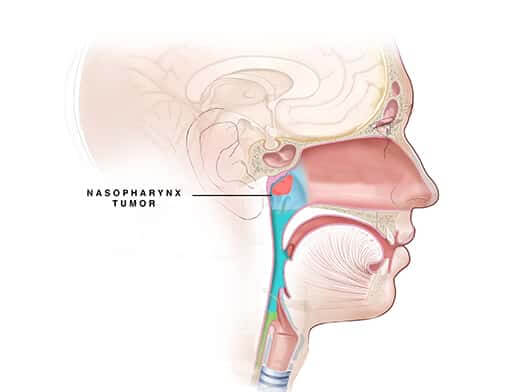- Surgery
- Radiation
- Medical Oncology
- Factors determining the surgical approach are the extent of tumours and the structures involved.
- Nasopharyngectomy – Removal of the tumours- For long, nasopharyngeal tumours were considered unresectable because of their central location and were surrounded by uninvolved bony structures. With newer endoscopic surgical techniques, surgeons can completely remove some nasopharyngeal tumours, but this is appropriate only for small tumours.
- For Primary tumours
-
Nasopharyngectomy is done as a primary treatment in the case of radioresistant tumours like adenocarcinomas, minor salivary gland tumours and sarcomas.
For advanced tumours extending into either the pterygoid muscle or the sinus, removal of the same is indicated, followed by reconstruction surgery through micro-vascular technique. - For Recurrent tumours
- Nasopharyngectomy (as a salvage procedure) is indicated in persistent or recurrent nasopharyngeal carcinoma.
- Neck dissection – Removal of lymph nodes.
-
Cancers of the nasopharynx often spread to the lymph nodes in the neck. These cancers typically respond well to treatment with radiation therapy (and sometimes chemotherapy).
In a few cases, cancer cells tend to remain despite the above treatment and may warrant a surgery called neck dissection to remove these lymph nodes.
- The Main treatment for all nasopharyngeal tumours is concurrent radiation and chemotherapy. There are various high-precision irradiation techniques like IMRT (intensity-modulated radiotherapy), IGRT (image-guided radiotherapy), and Rapid Arc or Proton beam therapy to treat these tumours. High precision irradiation techniques can reduce side effects like xerostomia (dryness in the mouth) and difficulty in swallowing and helps in a better quality of life.
- In cases of extensive nodal recurrence where microscopic disease may be present after formal neck dissection, additional radiotherapy can be delivered with after-loading brachytherapy.
- Chemotherapy
- Chemotherapy uses drugs to destroy cancer cells. The indication for chemotherapy is based on the stage of cancer and risk factors.
- Chemotherapy may be used before surgery to shrink large tumours, which makes it easier for remove the tumours.
- Few patients may require chemotherapy after surgery which helps to kill any residual cancer cells. It is also indicated in cases when the disease has spread to other parts of the body.
- Chemotherapy also may be used in cancers where the tumours are inoperable. Sometimes chemotherapy is combined with radiation therapy.
- Targeted drug therapy- The indication for targeted therapy is based on molecular changes in the cancer cell. This is usually combined with chemotherapy and may be an option in selected cases. In the case of recurrent disease, based on the molecular alterations noted in the tumours, specific targeted therapy is also an option. These are given in combination with chemotherapy.
- Immunotherapy - Immunotherapy is a drug treatment that uses the immune system to fight cancer. The indication for immunotherapy is based on immune-histochemical tests and molecular tests in advanced disease and recurrence. Generally, the patient tolerates immunotherapy well.



.png)
